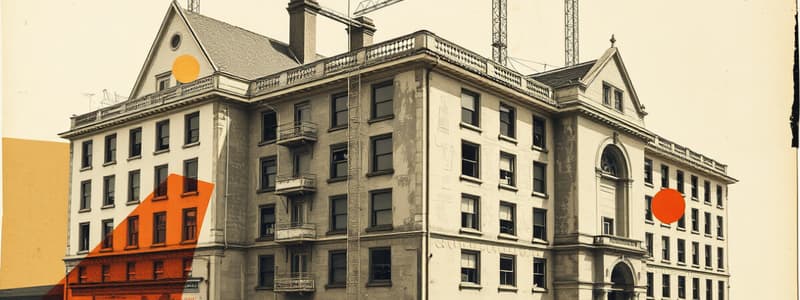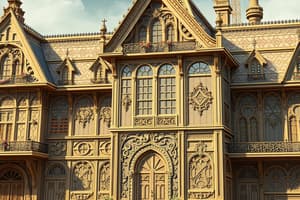Podcast
Questions and Answers
What are the three fundamental principles of architecture according to Vitruvius?
What are the three fundamental principles of architecture according to Vitruvius?
What does timely project completion ensure?
What does timely project completion ensure?
Meeting the client's needs and market demands.
The architect initiates the design process and develops the project's ______ plans.
The architect initiates the design process and develops the project's ______ plans.
conceptual
What can compromises in quality lead to?
What can compromises in quality lead to?
Signup and view all the answers
What should budgeting for a project include?
What should budgeting for a project include?
Signup and view all the answers
What does the role of architects primarily focus on?
What does the role of architects primarily focus on?
Signup and view all the answers
The process of ______ includes determining the types and sizes of spaces needed by the client.
The process of ______ includes determining the types and sizes of spaces needed by the client.
Signup and view all the answers
Who does the architect typically collaborate with during the design process?
Who does the architect typically collaborate with during the design process?
Signup and view all the answers
The bidding process occurs before the design is developed.
The bidding process occurs before the design is developed.
Signup and view all the answers
Study Notes
Basic Principles of Architecture
- Architecture is founded on three main principles: convenience, strength, and beauty.
- Vitrivius emphasized these principles over 2000 years ago, while Sir Henry Wotton later referred to them as "commoditie, firmness, and delight."
- Convenience pertains to the functional purpose of a building.
- Strength ensures buildings can endure environmental conditions and regular use.
- Beauty relates to the visual appeal of the structure, both inside and out.
Time Considerations
- Timely completion of projects is essential for fulfilling client expectations and market demands.
- Delays in construction can result in increased costs and risks of project cancellation.
Quality Requirements
- Acceptable strength and quality of materials are critical for the durability of structures.
- High-quality materials and craftsmanship guarantee the building’s safety and longevity.
- Compromising quality can cause structural failures, leading to safety hazards.
Client Considerations
- Cost is a primary factor; understanding the overall budget is crucial to prevent abandonment of expensive projects.
- Budgeting should encompass initial construction, long-term maintenance, and operational expenses.
Traditional Building Process
- The traditional process starts with an owner hiring an architect to develop designs tailored to their needs.
- Key planning elements include:
- Space Determination: Identifying necessary types and sizes of spaces.
- Location and Interconnection: Planning spatial relationships and interconnections.
- Circulation: Designing pathways and accessibility throughout the building.
- Environmental Control: Managing temperature, lighting, and acoustics effectively.
- Facilities: Incorporating essential support spaces, like restrooms and kitchens.
- Aesthetics: Ensuring the visual appeal aligns with client vision.
Role of the Architect
- Architects initiate the design process and create conceptual plans for the project.
- They are responsible for both aesthetic and functional dimensions of the building.
Role of Engineers and Consultants
- Engineers and consultants are engaged by architects for specialized expertise in various domains such as:
- Enclosure Determination: Designing the building's walls, roofs, and floors.
- Structural Support: Ensuring stability and integrity of the structure.
- Collaboration among professionals may vary, affecting the overall project execution.
Studying That Suits You
Use AI to generate personalized quizzes and flashcards to suit your learning preferences.
Related Documents
Description
This quiz explores the fundamental principles of architecture, focusing on convenience, strength, and beauty as defined by Vitrivius and Sir Henry Wotton. It also addresses the importance of timely project completion and the necessity of quality materials in construction. Test your knowledge on how these elements contribute to successful architecture.




